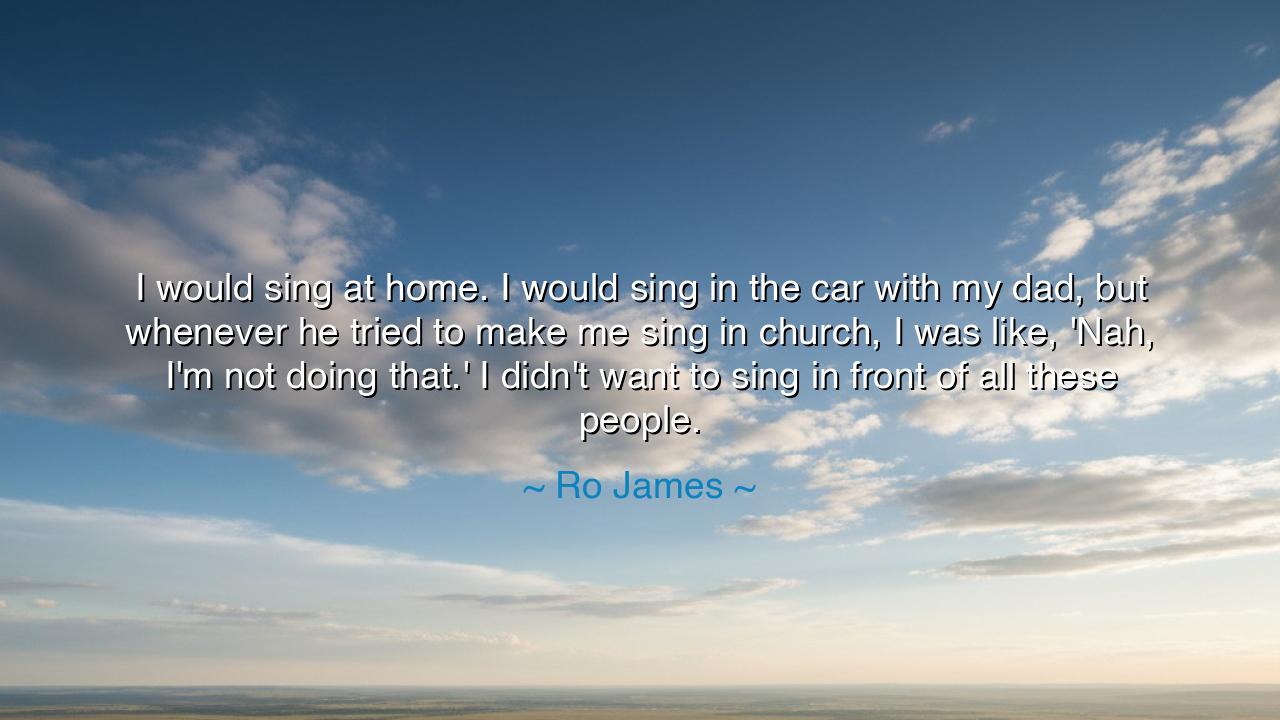
I would sing at home. I would sing in the car with my dad, but
I would sing at home. I would sing in the car with my dad, but whenever he tried to make me sing in church, I was like, 'Nah, I'm not doing that.' I didn't want to sing in front of all these people.






“I would sing at home. I would sing in the car with my dad, but whenever he tried to make me sing in church, I was like, ‘Nah, I’m not doing that.’ I didn’t want to sing in front of all these people.”
So spoke Ro James, the modern voice of soul and R&B, recalling the intimate beginnings of his musical journey. In these words lies a timeless truth: talent alone is never enough; courage and vulnerability are as essential to mastery as skill itself. Ro James’ reluctance to perform in public, despite the joy he found in private, reflects the ancient struggle between the safety of solitude and the boldness required to share one’s gifts with the world.
The origin of the quote emerges from the intersection of family, culture, and self-expression. Singing with his father, whether in the car or at home, provided a safe haven — a place to explore voice, rhythm, and emotion without judgment. Yet the public stage, represented here by the church, demanded more than technical ability: it demanded trust in oneself and in the audience. This hesitation mirrors the universal human experience of fear before exposure, of the tension between private joy and public scrutiny, which has challenged poets, orators, and musicians since time immemorial.
The ancients would have understood this perfectly. Plato, in his Republic, speaks of the necessity of practice and the cultivation of skill, but also of the courage to act upon one’s learning. Similarly, the Greek dramatists trained actors and choruses in private, but only through public performance could the full power of their art be realized. Ro James’ story is modern, yet it echoes the same principle: the journey from private mastery to public expression is a trial of the soul, not just the senses.
Consider historical examples of such hesitation overcome. Luciano Pavarotti, the famed tenor, recounted early years of trembling before audiences, despite knowing he could sing perfectly. h Piaf, the Little Sparrow of Paris, hid her voice in alleyways before finally captivating concert halls. Both artists experienced the same tension Ro James describes: the comfort of private expression versus the vulnerability demanded by public display. And yet, it was precisely through the courage to confront that fear that they transformed talent into legend.
Ro James’ experience also highlights the importance of supportive mentorship. His father encouraged him, offering opportunities for performance, yet allowed him to progress at his own pace. The balance of guidance and autonomy is an ancient principle: in China, Confucius taught that a teacher must respect the pace of the student’s learning, nurturing confidence without coercion. Similarly, the environment Ro James describes — singing freely at home and in the car — became fertile ground for both skill development and emotional courage.
There is a deeper lesson here about the nature of human growth. Talent flourishes in private, but greatness is forged in the fire of exposure. Fear of judgment is natural, yet the courage to step beyond comfort defines the path from potential to accomplishment. Ro James’ words remind us that hesitation is not failure, but the first stage of mastery. The reluctance to sing in church reflects self-awareness, humility, and sensitivity — qualities that, once acknowledged and navigated, strengthen both art and character.
Let this serve as guidance: cherish your private strengths, but do not confine them there. Seek opportunities to share your gifts, even when fear whispers that you are unready. Trust that practice, patience, and courage together will carry you through discomfort toward growth. Just as Ro James eventually found his voice in the wider world, so too can every seeker transform private skill into public triumph.
In the end, the quote speaks to all who struggle with exposure. Talent is only the beginning; vulnerability, courage, and trust are the bridges to mastery. Ro James teaches us that it is in the act of stepping beyond the safe space of home — in facing the judgment of many — that the private joy of art becomes its universal gift. Through this, we learn the eternal lesson of the ancients: the soul must dare to sing in public if it is ever to be heard.






AAdministratorAdministrator
Welcome, honored guests. Please leave a comment, we will respond soon